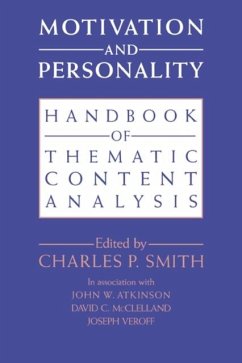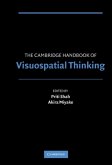Motivation and Personality (eBook, PDF)
Handbook of Thematic Content Analysis
Redaktion: Smith, Charles P.
71,95 €
71,95 €
inkl. MwSt.
Sofort per Download lieferbar

36 °P sammeln
71,95 €
Als Download kaufen

71,95 €
inkl. MwSt.
Sofort per Download lieferbar

36 °P sammeln
Jetzt verschenken
Alle Infos zum eBook verschenken
71,95 €
inkl. MwSt.
Sofort per Download lieferbar
Alle Infos zum eBook verschenken

36 °P sammeln
Motivation and Personality (eBook, PDF)
Handbook of Thematic Content Analysis
Redaktion: Smith, Charles P.
- Format: PDF
- Merkliste
- Auf die Merkliste
- Bewerten Bewerten
- Teilen
- Produkt teilen
- Produkterinnerung
- Produkterinnerung

Bitte loggen Sie sich zunächst in Ihr Kundenkonto ein oder registrieren Sie sich bei
bücher.de, um das eBook-Abo tolino select nutzen zu können.
Hier können Sie sich einloggen
Hier können Sie sich einloggen
Sie sind bereits eingeloggt. Klicken Sie auf 2. tolino select Abo, um fortzufahren.

Bitte loggen Sie sich zunächst in Ihr Kundenkonto ein oder registrieren Sie sich bei bücher.de, um das eBook-Abo tolino select nutzen zu können.
Motivation and Personality is the first book to be devoted to content analysis systems for assessment of characteristics of the individuals, groups, or historical periods which create verbal materials. Manuals for using the various systems, research regarding the background of the systems and practice materials are included to create a book which is both a work of reference and a handbook.
- Geräte: PC
- mit Kopierschutz
- eBook Hilfe
- Größe: 88.87MB
- FamilySharing(5)
Andere Kunden interessierten sich auch für
![Delta Theory and Psychosocial Systems (eBook, PDF) Delta Theory and Psychosocial Systems (eBook, PDF)]() Roland G. TharpDelta Theory and Psychosocial Systems (eBook, PDF)29,95 €
Roland G. TharpDelta Theory and Psychosocial Systems (eBook, PDF)29,95 €![Cognitive Motivation (eBook, PDF) Cognitive Motivation (eBook, PDF)]() David BeswickCognitive Motivation (eBook, PDF)107,95 €
David BeswickCognitive Motivation (eBook, PDF)107,95 €![Finding Harmony (eBook, PDF) Finding Harmony (eBook, PDF)]() Matthew Del NevoFinding Harmony (eBook, PDF)9,95 €
Matthew Del NevoFinding Harmony (eBook, PDF)9,95 €![Decisions about Decisions (eBook, PDF) Decisions about Decisions (eBook, PDF)]() Cass R. SunsteinDecisions about Decisions (eBook, PDF)29,95 €
Cass R. SunsteinDecisions about Decisions (eBook, PDF)29,95 €![Cambridge Handbook of Motivation and Learning (eBook, PDF) Cambridge Handbook of Motivation and Learning (eBook, PDF)]() K. Ann RenningerCambridge Handbook of Motivation and Learning (eBook, PDF)48,95 €
K. Ann RenningerCambridge Handbook of Motivation and Learning (eBook, PDF)48,95 €![Cambridge Handbook of Visuospatial Thinking (eBook, PDF) Cambridge Handbook of Visuospatial Thinking (eBook, PDF)]() Cambridge Handbook of Visuospatial Thinking (eBook, PDF)45,95 €
Cambridge Handbook of Visuospatial Thinking (eBook, PDF)45,95 €![International Handbook of Creativity (eBook, PDF) International Handbook of Creativity (eBook, PDF)]() International Handbook of Creativity (eBook, PDF)40,95 €
International Handbook of Creativity (eBook, PDF)40,95 €-
-
-
Motivation and Personality is the first book to be devoted to content analysis systems for assessment of characteristics of the individuals, groups, or historical periods which create verbal materials. Manuals for using the various systems, research regarding the background of the systems and practice materials are included to create a book which is both a work of reference and a handbook.
Dieser Download kann aus rechtlichen Gründen nur mit Rechnungsadresse in A, B, BG, CY, CZ, D, DK, EW, E, FIN, F, GR, HR, H, IRL, I, LT, L, LR, M, NL, PL, P, R, S, SLO, SK ausgeliefert werden.
Produktdetails
- Produktdetails
- Verlag: Cambridge University Press
- Erscheinungstermin: 26. Juni 1992
- Englisch
- ISBN-13: 9780511832666
- Artikelnr.: 56705733
- Verlag: Cambridge University Press
- Erscheinungstermin: 26. Juni 1992
- Englisch
- ISBN-13: 9780511832666
- Artikelnr.: 56705733
- Herstellerkennzeichnung Die Herstellerinformationen sind derzeit nicht verfügbar.
Preface
Acknowledgements
1. Introduction: inferences from verbal material
Part I. General Issues: 2. Motivational determinants of thematic apperception
3. How do self-attributed and implicit motives differ?
4. Thematic analysis, experience sampling, and personal goals
5. Motivational configurations
6. Thematic apperceptive methods in survey research
7. Content analysis of archival materials, personal documents, and everyday verbal productions
8. Reliability issues
Part II. Content Analysis Systems: 9. The achievement motive
10. A scoring manual for the achievement motive
11. The motive to avoid success
12. A revised scoring manual for the motive to avoid success
Part III. Afflilation: 13. The affiliation motive
14. A scoring manual for the affiliation motive
15. The intimacy motive
16. The intimacy motivation scoring system
17. Affiliative trust-mistrust
18. A scoring system for affiliative trust-mistrust
Part IV. Power: 19. Power motivation
20. A scoring manual for the power motive
21. Power motivation revisited
22. A revised scoring system for the power motive
Part V. Attribution and Cognitive Orientations: 23. Personal causation and the origin concept
24. The origin scoring system
25. Explanatory style
26. The explanatory style scoring manual
27. Conceptual/integrative complexity
28. The conceptual/integrative complexity scoring manual
29. Uncertainty orientation
30. A manual for scoring need for uncertainty
Part VI. Psychosocial Orientations: 31. Assessing adaptation to life changes in terms of psychological stances toward the environment
32. Scoring manual for psychological stances toward the environment
33. Self-definition and social definition: personal styles reflected in narrative style
34. Revised scoring manual for self-definition and social definition
35. Responsibility
36. Scoring system for responsibility
Part VII. Methodology, Scorer Training, Data Collection: 37. Methodological consideration: steps in research employing content analysis systems
Appendixes
References
Indexes.
Acknowledgements
1. Introduction: inferences from verbal material
Part I. General Issues: 2. Motivational determinants of thematic apperception
3. How do self-attributed and implicit motives differ?
4. Thematic analysis, experience sampling, and personal goals
5. Motivational configurations
6. Thematic apperceptive methods in survey research
7. Content analysis of archival materials, personal documents, and everyday verbal productions
8. Reliability issues
Part II. Content Analysis Systems: 9. The achievement motive
10. A scoring manual for the achievement motive
11. The motive to avoid success
12. A revised scoring manual for the motive to avoid success
Part III. Afflilation: 13. The affiliation motive
14. A scoring manual for the affiliation motive
15. The intimacy motive
16. The intimacy motivation scoring system
17. Affiliative trust-mistrust
18. A scoring system for affiliative trust-mistrust
Part IV. Power: 19. Power motivation
20. A scoring manual for the power motive
21. Power motivation revisited
22. A revised scoring system for the power motive
Part V. Attribution and Cognitive Orientations: 23. Personal causation and the origin concept
24. The origin scoring system
25. Explanatory style
26. The explanatory style scoring manual
27. Conceptual/integrative complexity
28. The conceptual/integrative complexity scoring manual
29. Uncertainty orientation
30. A manual for scoring need for uncertainty
Part VI. Psychosocial Orientations: 31. Assessing adaptation to life changes in terms of psychological stances toward the environment
32. Scoring manual for psychological stances toward the environment
33. Self-definition and social definition: personal styles reflected in narrative style
34. Revised scoring manual for self-definition and social definition
35. Responsibility
36. Scoring system for responsibility
Part VII. Methodology, Scorer Training, Data Collection: 37. Methodological consideration: steps in research employing content analysis systems
Appendixes
References
Indexes.
Preface
Acknowledgements
1. Introduction: inferences from verbal material
Part I. General Issues: 2. Motivational determinants of thematic apperception
3. How do self-attributed and implicit motives differ?
4. Thematic analysis, experience sampling, and personal goals
5. Motivational configurations
6. Thematic apperceptive methods in survey research
7. Content analysis of archival materials, personal documents, and everyday verbal productions
8. Reliability issues
Part II. Content Analysis Systems: 9. The achievement motive
10. A scoring manual for the achievement motive
11. The motive to avoid success
12. A revised scoring manual for the motive to avoid success
Part III. Afflilation: 13. The affiliation motive
14. A scoring manual for the affiliation motive
15. The intimacy motive
16. The intimacy motivation scoring system
17. Affiliative trust-mistrust
18. A scoring system for affiliative trust-mistrust
Part IV. Power: 19. Power motivation
20. A scoring manual for the power motive
21. Power motivation revisited
22. A revised scoring system for the power motive
Part V. Attribution and Cognitive Orientations: 23. Personal causation and the origin concept
24. The origin scoring system
25. Explanatory style
26. The explanatory style scoring manual
27. Conceptual/integrative complexity
28. The conceptual/integrative complexity scoring manual
29. Uncertainty orientation
30. A manual for scoring need for uncertainty
Part VI. Psychosocial Orientations: 31. Assessing adaptation to life changes in terms of psychological stances toward the environment
32. Scoring manual for psychological stances toward the environment
33. Self-definition and social definition: personal styles reflected in narrative style
34. Revised scoring manual for self-definition and social definition
35. Responsibility
36. Scoring system for responsibility
Part VII. Methodology, Scorer Training, Data Collection: 37. Methodological consideration: steps in research employing content analysis systems
Appendixes
References
Indexes.
Acknowledgements
1. Introduction: inferences from verbal material
Part I. General Issues: 2. Motivational determinants of thematic apperception
3. How do self-attributed and implicit motives differ?
4. Thematic analysis, experience sampling, and personal goals
5. Motivational configurations
6. Thematic apperceptive methods in survey research
7. Content analysis of archival materials, personal documents, and everyday verbal productions
8. Reliability issues
Part II. Content Analysis Systems: 9. The achievement motive
10. A scoring manual for the achievement motive
11. The motive to avoid success
12. A revised scoring manual for the motive to avoid success
Part III. Afflilation: 13. The affiliation motive
14. A scoring manual for the affiliation motive
15. The intimacy motive
16. The intimacy motivation scoring system
17. Affiliative trust-mistrust
18. A scoring system for affiliative trust-mistrust
Part IV. Power: 19. Power motivation
20. A scoring manual for the power motive
21. Power motivation revisited
22. A revised scoring system for the power motive
Part V. Attribution and Cognitive Orientations: 23. Personal causation and the origin concept
24. The origin scoring system
25. Explanatory style
26. The explanatory style scoring manual
27. Conceptual/integrative complexity
28. The conceptual/integrative complexity scoring manual
29. Uncertainty orientation
30. A manual for scoring need for uncertainty
Part VI. Psychosocial Orientations: 31. Assessing adaptation to life changes in terms of psychological stances toward the environment
32. Scoring manual for psychological stances toward the environment
33. Self-definition and social definition: personal styles reflected in narrative style
34. Revised scoring manual for self-definition and social definition
35. Responsibility
36. Scoring system for responsibility
Part VII. Methodology, Scorer Training, Data Collection: 37. Methodological consideration: steps in research employing content analysis systems
Appendixes
References
Indexes.







